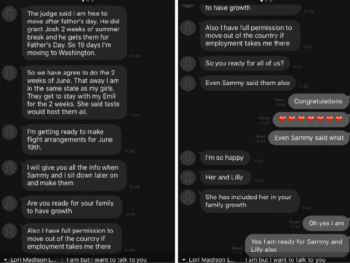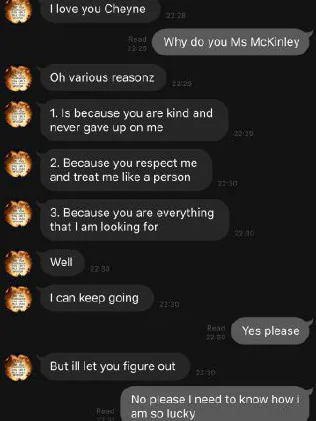When Real People Scam!
A SCARS Special Report
Real People Engage In Relationship Scams Too!
Examples Of Texts And Photos Woman Used To Scam A Man On An Online Game
It is important for everyone online looking for love to understand! But both men and women lie to prospective partners all the time!
Real People Engage In Relationship Scams Too!
Men and women lie to potential dates online all the time, but when it crosses into true deception it becomes a scam!
Here Is One Such Example
A Stranger Used An Intricate Web Of Lies And Deceiving Messages To Catfish A Newly Divorced Man, Making Him Fall In Love With Her And Leaving Him “Humiliated”
“I have never been so humiliated in my life.”
This is how a newly divorced dad felt after he discovered the woman he had been talking to for over a year and had planned to start a new life with didn’t actually exist.
A Canadian man, Cheyne, had his whole life turned upside-down by a woman he met on his favorite online game, Game Of War.
For a whole year, he spoke with a woman who he thought was named Lori McKinley, sharing loving messages and pictures, secrets, and planning their life together.
But it was only when he contacted an organization that helps verify people’s real identities, that Cheyne came to realize the person he had fallen in love with was not who she said she was.
It’s Not Always Africans!
“I was in love, but I was in love with someone who wasn’t real,” Cheyne said. “For me, it’s like somebody died.”
His horror ordeal started in July 2016 when Cheyne was 48, newly divorced, and working as a tractor driver.
He was introduced to Lori, a 33-year-old American woman, by a mutual friend in the online game and they hit it off almost immediately.
They began chatting through the game daily. This soon moved on to emailing and texting and then progressed to a regular phone conversation.
The two had such a great connection that when Lori first sent him a photo of herself he didn’t mind that she wasn’t his usual type.
She was skinny, with long brown hair, pale skin, and blue eyes. However, the more they spoke the more attractive he found her.
As their relationship progressed, the couple would exchange heartfelt text messages and emails, with Lori constantly reassuring Cheyne of how much she loved and adored him.
There were red flags that started appearing early on in their relationship, but Cheyne pushed them aside, always accepting the hasty explanations Lori gave him.
One of the first things he noticed was Lori appeared to look different in one of the photos she sent him. She explained it away as an old photo from her younger days.
It was only when his 18-year-old daughter mentioned that Lori might not be who she said she was, did he suggest that the two talk via video chat.
At first, Lori resisted, claiming her religious father who she and her daughters lived with thought video chatting was “the work of the devil”.
But one night she managed to sneak onto the computer and video call him for a few minutes. It was only enough time for Cheyne to see her face and confirm it was the woman he had been receiving pictures of. That was more than enough for him and made it easier to push aside the other strange events that came after.
Lies Are Lies Regardless Of The Source
He admits now that he was lonely and Lori was one of the few people he felt he could talk to, which led to him wanting to believe her.
“I was struggling with being alone again after separation and divorce,” he said. “I was isolated and Lori was the only person I had in my corner at this point in my life.”
It was after the two set a date to meet that Cheyne’s suspicions started to creep back in.
Just as they were planning to see each other, Lori had to have emergency surgery to remove cancer cells in her uterus.
So they set a later date but then she found out the doctor had nicked her bladder during the surgery and had to have it rectified.
They continued to set dates and things continued to happen that meant Lori couldn’t go, including being assaulted by her violent ex, her father having two strokes, her grandmother dying, her sister attempting suicide, and having to go to court with her ex but having the date pushed back because his dad had a heart attack.
“It was all part and parcel of the web of deception she was weaving and how caught up in it I had become,” Cheyne said.
Throughout all of this Lori continued to tell Cheyne she was in the process of getting everything sorted so she could move in with him.
He wanted to believe her but her lies had become too much and he contacted Social Catfish, which is when he found out the devastating truth a full year after they had met.
Her name was not Lori McKinley and she was not 33. Her real name was Laurie, she was 42, overweight, and feeling bad about herself.
The images that she had been sending Cheyne were of her 23-year-old daughter Leigha.
When Cheyne confronted both the women via video chat all Leigha said to him was “get the f**k over it”.
“Nobody has ever taken my emotions on such a ride before,” he said. “I will never again make this mistake as it has cost me months and months, a full year of emotional investment.”
Confused, hurt, and still in love with the woman Laurie had made up, he continued to speak with her for a time but eventually, he realized that he had to let go of Lori McKinley.
He cut all contact with her and, while it was painful at first he has started to meet other people.
“I stopped talking to her without notice. It’s been six months now,” Cheyne said. “I have started dating in the real world and I am dating and meeting real people, face-to-face, eye-to-eye.”
Even though it is a cliche, Cheyne’s advice is that if it sounds to good to be true, it probably is.
“If the stories seem over the top and don’t add up, those are red flags. Trust your intuition and get out as soon as possible.”
Summary
Just as with all relationship scams, the trauma comes from the incredible shock of discovering the deception. In the end, it does not matter much if it is a professional scammer or just someone doing it for their own purposes, it is still just as devastating.
Unfortunately, laws are fairly strong when it comes to professional scammers scamming real people, but not nearly strong enough when it comes to people who just lie. The heartbreak and trauma are the same (maybe worse). It is certainly easier to accept that you have been scammed by a pro, but infinitely difficult to understand the motivations of someone like the scammer above.
This is just one tale, there are many millions who have gone into real relationships – from a distance or in-person – only to find they were being lied to. Where does it cross over from harmless to a crime? Actually, that part is simpler. If the victim provided anything of value to the scammer as a result of the deception then it is fraud.
Be careful out there!
Source: https://www.news.com.au/lifestyle/relationships/dating/texts-and-photos-woman-used-to-catfish-a-man-on-an-online-game/news-story/c72bcf88804e4a9b9c4beae5431db325
TAGS: SCARS, Information About Scams, Anti-Scam, Scams, Scammers, Fraudsters, Cybercrime, Crybercriminals, Romance Scams, Scam Victims, Online Fraud, Online Crime Is Real Crime, Scam Avoidance, Relationship Scam, Real Scammers, Real People Lie Too, Deception In Dating, Dating Lies
PLEASE SHARE OUR ARTICLES WITH YOUR FRIENDS & FAMILY
HELP OTHERS STAY SAFE ONLINE – YOUR KNOWLEDGE CAN MAKE THE DIFFERENCE!
THE NEXT VICTIM MIGHT BE YOUR OWN FAMILY MEMBER OR BEST FRIEND!
By the SCARS™ Editorial Team
Society of Citizens Against Relationship Scams Inc.
A Worldwide Crime Victims Assistance & Crime Prevention Nonprofit Organization Headquartered In Miami Florida USA & Monterrey NL Mexico, with Partners In More Than 60 Countries
To Learn More, Volunteer, or Donate Visit: www.AgainstScams.org
Contact Us: Contact@AgainstScams.org













Leave A Comment